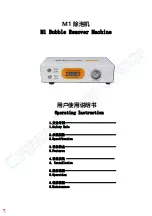
©2007-2015 Physio-Control, Inc.
LIFEPAK 15 Monitor/Defibrillator Operating Instructions
v
Chapter 1 Preface
9
Introduction .............................................................................................................................. 11
Intended Use ............................................................................................................................ 11
Modes of Operation ................................................................................................................. 12
Chapter 2 Safety Information
13
Terms ....................................................................................................................................... 15
General Dangers and Warnings ............................................................................................... 15
Chapter 3 Basic Orientation
19
Front View ................................................................................................................................ 21
Back View ................................................................................................................................ 31
Batteries ................................................................................................................................... 33
Home Screen ........................................................................................................................... 34
Alarms ...................................................................................................................................... 39
Options..................................................................................................................................... 41
Events ...................................................................................................................................... 43
Chapter 4 Monitoring
45
Monitoring the ECG ................................................................................................................. 47
Acquiring a 12-Lead ECG ........................................................................................................ 58
Monitoring SpO2, SpCO, and SpMet ...................................................................................... 68
Monitoring Noninvasive Blood Pressure ................................................................................. 79
Monitoring ETCO2 ................................................................................................................... 87
Monitoring Invasive Pressure .................................................................................................. 94
Monitoring Continuous Temperature ..................................................................................... 103
Vital Sign and ST Segment Trends ........................................................................................ 107
Chapter 5 Therapy
113
General Therapy Warnings and Cautions .............................................................................. 115
Therapy Electrode and Standard Paddle Placement ............................................................ 116
Automated External Defibrillation (AED) ................................................................................ 119
Manual Defibrillation .............................................................................................................. 132
Synchronized Cardioversion Procedure ................................................................................ 137
Noninvasive Pacing ............................................................................................................... 141
Pediatric ECG Monitoring and Manual Mode Therapy Procedures ...................................... 147
Contents
Summary of Contents for LIFEPAK 15
Page 1: ...MONITOR DEFIBRILLATOR Operating Instructions ...
Page 2: ......
Page 3: ...MONITOR DEFIBRILLATOR Operating Instructions ...
Page 8: ......
Page 10: ......
Page 14: ......
Page 20: ......
Page 44: ......
Page 46: ......
Page 112: ......
Page 114: ......
Page 148: ......
Page 150: ......
Page 160: ......
Page 174: ......
Page 190: ......
Page 198: ......
Page 200: ......
Page 222: ......
Page 244: ......
Page 250: ......
Page 252: ......
Page 258: ......
Page 262: ......
Page 268: ......






































